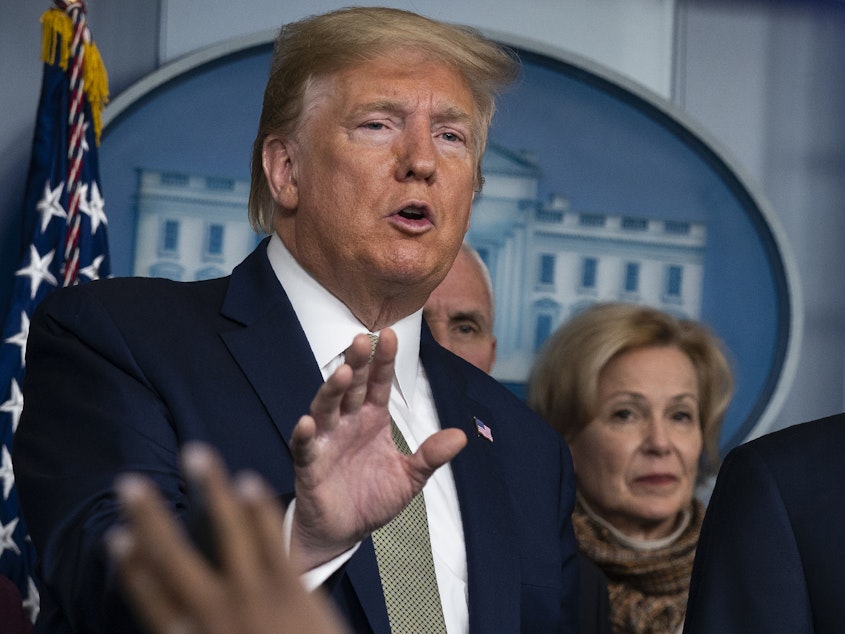Trump Shuts Border With Canada, Blames 'Chinese Virus' As Coronavirus Spreads

Updated at 9:45 a.m. ET
The U.S.-Canada border — the longest undefended border in the world — will shut down "by mutual consent," President Trump said on Wednesday, the latest in a long series of actions aimed at reducing the spread of the coronavirus.
The pandemic has shut down travel around the world. Trump made his announcement on Twitter. Canadian Prime Minister Justin Trudeau had not yet made the same announcement, and details were not available.
Trump said he would have a news conference on Wednesday about "some very important news" from the Food and Drug Administration about the coronavirus — a pandemic he is increasingly referring to as "the Chinese Virus."
Details about the announcement were not immediately available. The White House scheduled a briefing to provide an update on its response at 11:30 a.m. ET. Watch live here.
Trump has pivoted to using the term "Chinese virus" to describe the pandemic in tweets and statements. For example, on Tuesday, he used the term in a meeting with CEOs from the hotel industry — a sector ravaged by the pandemic.
The outbreak has disrupted the economy, as people work from home to avoid contact and to look after kids shut out of schools. Travel and entertainment sectors have ground to a halt. Experts have said the worst is yet to come as the number of infected people grows.
Asked on Tuesday whether he would continue using the term "Chinese virus," Trump rejected criticism that he was creating a stigma and said he was hitting back at China for statements about the U.S. military.
"China was putting out information, which was false, that our military gave this to them. That was false. And rather than having an argument, I said I have to call it where it came from — it did come from China. So I think it's a very accurate term," he said.
Trump also is scheduled to talk to doctors, nurses and business executives on Wednesday about how his administration is responding to the coronavirus pandemic that continues to spread across the country, paralyzing the economy.
The White House is scrambling to help states and cities ramp up testing sites and bolster hospitals expecting to see a surge in patients with the respiratory illness caused by the virus. The task force leading the response plans to meet on Wednesday with academic experts who have modeled the spread of the disease. Trump will hold calls with a group of physicians and a group of nurses.
Separately, Trump will talk to airline CEOs, the second time this month he has talked to an industry that has seen its traffic grind to a halt as people stay home. The industry says the pandemic has had a more deleterious effect on business than the attacks of Sept. 11, 2001, and has sought a government bailout.
"We don't want airlines going out of business. We don't want people losing their jobs," Trump said at a press conference on Tuesday. "We're going big."
Trump also was set to join a conference call with the Business Roundtable, CEOs from the country's largest companies.
Meanwhile, the Trump administration is asking Congress for $45.8 billion in emergency money that includes resources for the Centers for Disease Control and Prevention, funding for states' public health needs, and research resources at the National Institutes of Health. The request comes as the Senate is expected to vote Wednesday on a separate House-approved package that provides economic relief to those affected and resources for testing.
The White House is also pitching Congress on an economic rescue package worth about $1 trillion. That's 45 percent more than federal defense spending in 2019, and would eclipse the former Obama administration's 2009 stimulus package of $787 billion.
NPR's Claudia Grisales contributed to this story. [Copyright 2020 NPR]



